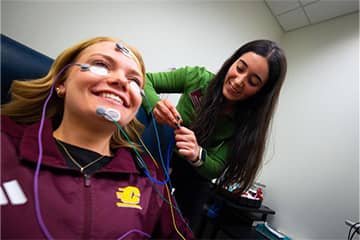CMU undergrad provides hope through internship
Rebecca Terpening plans to build community engagement and education on PBB health issues
Last fall, Rebecca Terpening attended a biannual polybrominated biphenyls (PBB) update at Central Michigan University’s College of Medicine. According to the Michigan Department of Health and Human Services, in 1973, PBBs were sold as FireMaster by the Michigan Chemical Company (or Velsicol Chemical Corporation) in St. Louis, Michigan. The same plant produced magnesium oxide, sold as NutriMaster. Due to a shortage of preprinted paper bags, the plant mistakenly shipped FireMaster instead of NutriMaster to Michigan Farm Bureau Services, which ended up in feed mills and were used for dairy cattle. According to the Michigan Department of Health and Human Services, this mix-up was discovered in 1974, resulting in PBBs in the food chain through milk and dairy products, beef, pork, lamb, chicken, and eggs. More than 30,000 cattle, 4,500 pigs, 1,500 sheep, and 1.5 million chickens were contaminated, in addition to 800 tons of animal feed, 18,000 pounds of cheese, 2,500 pounds of butter, 5 million eggs, and 34,000 pounds of dried milk products.
At the biannual update, Ms. Terpening found herself moved and empowered as she listened to the community that was impacted by this chemical mix-up. She saw community members still heartbroken as they described their experience. Community members even expressed fears of this chemical spill being forgotten. Ms. Terpening had the opportunity to inform attendees that this event was not forgotten. She explained, “In all my science textbooks, public health textbooks, this event is identified as one of the biggest chemical spills.” Since this update, Ms. Terpening has made it her mission to educate the community through her internship.
Throughout her internship, she has continued to learn more and work with the Mid Michigan District Health Department. “Ongoing research of this chemical spill continues today through studying health issues of farmers and chemicals. 6/10 Michiganders have higher levels of PBB than anywhere in the country, and we’ve learned that this chemical passes through breastmilk and in utero, so there are 2nd and 3rd generation of individuals having health problems,” Ms. Terpening explained.
Earlier in March, Ms. Terpening served on a panel with experts at a PBB Community Meeting—an amazing experience for an intern and the community. Her presence on this panel was transformational and provides hope for continued efforts of research and awareness. Ms. Terpening hopes to build community engagement and education on health issues families may be faced with from this past exposure and continue the public health work into the next generation of professionals.
Ms. Terpening is expecting to graduate in May, and is beginning her Master of Public Health degree in Fall, 2025. CMU looks forward to the work that Ms. Terpening will continue to do and the impact she will make in the future of healthcare. By offering practical experience that has real-world implications, students are better equipped to graduate from health programs with enhanced preparedness for their future endeavors.
To learn more about the PBB chemical spill, visit Emory University's Michigan PBB Registry or The History of PBBs in Michigan on MDHHS website.




